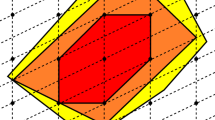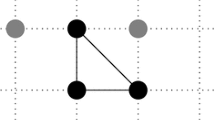Abstract
We consider the mixed-integer set \({X=\{(s,x,y) \in \mathbb{R}\times \mathbb{Z}^n \times \mathbb{Z}^m: s + a_1 x_j \geq b_j, \forall j \in N_1, s + a_2 y_j \geq d_j, j \in N_2\}}\) where \({N_1 = \{1,\ldots,n\},\; N_2 = \{1,\ldots,m\}}\) and \({a_1, a_2 \in\mathbb{Z}_+\setminus\{0\}}\). This set may arise in a relaxation of mixed-integer problems such as lot-sizing problems. We decompose X into a small number of subsets whose convex hull description is trivial. The convex hull of X is equal to the closure of the convex hull of the union of those polyhedra. Using a projection theorem from Balas (Discret Appl Math 89:3–44, 1998) we obtain a compact characterization of the facets of the convex hull of X. Then by studying the projection cone we characterize all the facet-defining inequalities of the convex hull of X in the space of the original variables. Each of those inequalities is either a mixed MIR inequality (Günlük and Pochet in Math Programm 90:429–457, 2001), or it is based on a directed cycle on a special bipartite graph. When a 1 and a 2 are relative prime, the convex hull of X is described by the mixed MIR inequalities.
Similar content being viewed by others
References
Agra A., Constantino M.: A compact formulation of a mixed-integer set. Optimization 59(5), 729–745 (2010)
Balas E.: Disjuntive programming: properties of the convex hull of feasible points. Discret. Appl. Math. 89, 3–44 (1998)
Balas, E.: Projection and lifting in combinatorial optimization. In: Junger, M., Naddef, D. (eds.) Computational Combinatorial Optimization. Lect. Notes Comput. Sci. 2241, 26–56 (2001)
Conforti, M., Cornujols, G., Zambelli, G.: Polyhedral approaches to mixed integer linear programming. In: 50 Years of Integer Programming, pp. 1958–2008. Springer, Berlin (2010)
Conforti M., Wolsey L.: Compact formulations as union of polyhedra. Math. Programm. 114, 277–289 (2008)
Conforti M., Di Summa M., Wolsey L.: The mixing set with flows. SIAM J. Discret. Math. 21, 396–407 (2007)
Conforti M., Di Summa M., Eisenbrand F., Wolsey L.: Network formulations of mixed-integer programs. Math. Oper. Res. 34, 194–209 (2009)
Conforti, M., Di Summa, M., Wolsey, L.: The Mixing Set with Divisible Capacities. In: Lodi, A., Pasconensi, A., Rinaldi, G. (eds.) Integer programming and combinatorial optimization. Lect. Notes Comput. Sci. 5035, 435–449 (2008)
Conforti M., Zambelli G.: The mixing set with divisible capacities: a simple approach. Oper. Res. Lett. 37, 379–383 (2009)
Constantino M., Miller A., van Vyve M.: Mixing MIR inequalities with two divisible coefficients. Math. Programm. 123, 451–483 (2010)
Di Summa M.: The Mixing Set with Divisible Capacities. Working paper. University of Padua, Padua (2007)
Eisenbrand F., Rothvoß T.: New hardness results for diophantine approximation. Lect. Notes Comput. Sci. 5687, 98–110 (2009)
Günlük O., Pochet Y.: Mixing mixed integer inequalities. Math. Programm. 90, 429–457 (2001)
Marchand H., Martin A., Weismantel R., Wolsey L.: Cutting planes in integer and mixed integer programming. Discret. Appl. Math. 123, 397–446 (2002)
Marchand H., Wolsey L.: Aggregation and mixed integer rounding to solve MIP’s. Oper. Res. 49, 363–371 (2001)
Nemhauser G., Wolsey L.: Integer and Combinatorial Optimization. Wiley, New York (1988)
Pochet Y., Wolsey L.: Production Planning by Mixed Integer Programming. Springer, Berlin (2005)
Wolsey L.: Strong formulations for mixed integer programs: valid inequalities and extended formulations. Math. Programm. 97, 423–447 (2003)
Zhao M., De Farias I.: The mixing-MIR set with divisible capacities. Math. Programm. 115, 73–103 (2008)
Author information
Authors and Affiliations
Corresponding author
Additional information
A. Agra research partially funded by CIDMA—Centro de Investigação e Desenvolvimento em Matemática e Aplicações, from the FCT (Fundação para a Ciência e a Tecnologia). M. Constantino research partially funded by CIO—Centro de Investigação Operacional [MATH-LVT-Lisboa-152], from FCT (Fundação para a Ciência e a Tecnologia).
Rights and permissions
About this article
Cite this article
Agra, A., Constantino, M. Mixing polyhedra with two non divisible coefficients. Math. Program. 135, 45–87 (2012). https://doi.org/10.1007/s10107-011-0448-0
Received:
Accepted:
Published:
Issue Date:
DOI: https://doi.org/10.1007/s10107-011-0448-0




